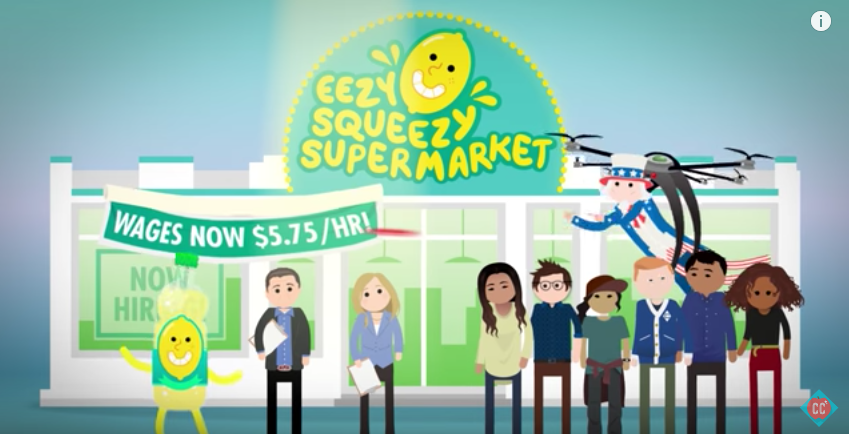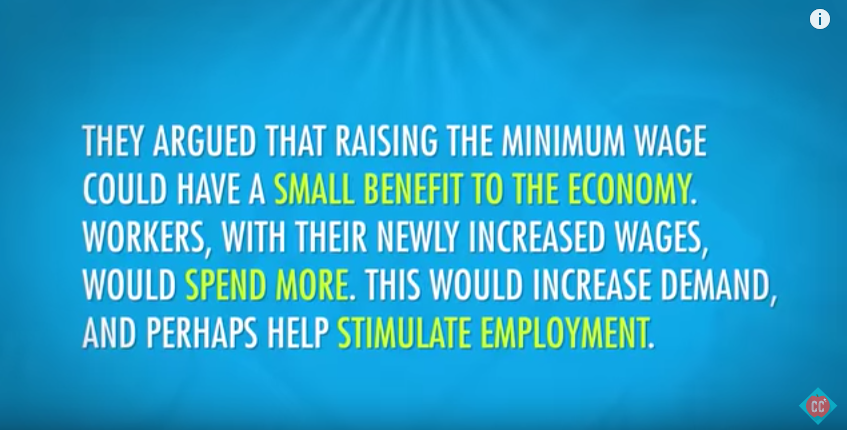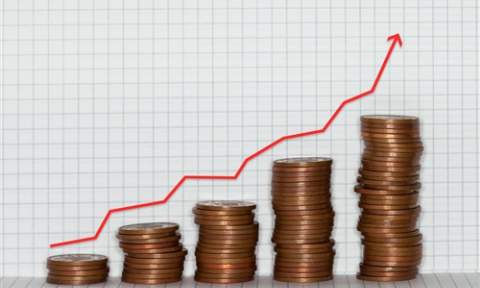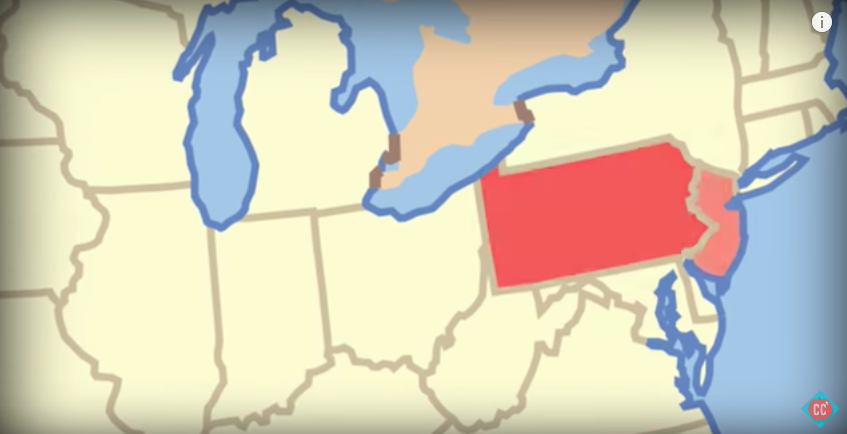This is the episode you’ve long awaited for: the minimum wage. I’ve been excited for this one since episode #20, where Crash Course talked at length about the dangers of price floors, and ended with this:
The vast majority of economists consider price controls counter-productive. But there is one notable exception: minimum wage. The minimum wage is a really complex issue that we’re going to address in a future video.
And finally, here we are. Let’s see if Crash Course explains why the dangers of price floors do not apply to labor. Here we go:
Labor Markets
Crash Course’s does a fantastic job in explaining the labor market. The entire segment is spot on, from how wages are determined to how the demand for labor affects wages. There are also some great nuggets of wisdom:

Engineers are in high demand because they produce the products that many consumers want and their supply is limited because the training for these jobs is pretty difficult. Social workers and historians, aren’t paid as much, even though their work is important, because demand is relatively low and supply is relatively high. It’s not rocket science.
While the supply and demand of labor play a major role in determining wages, I wish Crash Course had included a reference to the marginal productivity of labor. In other words, the market creates a natural ceiling on hourly wages: the amount of revenue one employee can create per hour. If an additional employee at a Pretzel Shop can only create an additional $9 in revenue per hour, the employer cannot possibly hire him from $10 an hour.
The Debate on the Minimum Wage: Bargaining Power

The economists that support a minimum wage argue that real life labor markets aren’t as competitive or transparent as classical economists suggest. They believe that employers have the upper hand when it comes to negotiating wages and that individual workers lack bargaining power.
Let’s imagine this scenario as described: an employer has an opening for one job at the Pretzel Shop. There is a long line of applicants who want the job, which gives the employer the pick of the litter. It looks like the employer has the upper hand here, since he doesn’t have to think about what wage to offer the applicant in their negotiation, and there are a lot of applicants to choose from.
Now imagine if there weren’t a minimum wage. The employer would be under a lot more pressure to offer the appropriate wage for the employee’s approximate skill, and offer a wage that is higher than other potential employers in town. With more jobs available around at below-minimum-wage levels, employees have a lot more options for employment and a lot more in bargaining power when finding new employment.
The point here is that employers have a greater bargaining power because of the minimum wage, not in spite of it, so I don’t see why this argument favors having a minimum wage.
The Debate on the Minimum Wage: The Nuts and Bolts

If a grocery store wasn’t required to pay $7.25 an hour, and the grocery store was the only place hiring, they could likely squeeze individual employees to accepting lower than market value. In this interpretation, minimum wage isn’t interfering with competitive markets, as much as it’s correcting a market failure.
This is strange, because back in episode 21, Crash Course taught us that a market failure is when the free market does not produce some good on its own, so it must be implemented by government (they use the examples of national defense and schooling).
In this week’s episode, it appears that a market failure is just something that happens in a free market that you don’t like.
Whether or not a grocery store is the only place hiring (something that’s very unlikely) wages are still determined as they always are: applicants compete on the bases of price and value provided. If the grocery store is the only place hiring, why should the grocery store be punished because of it? What about the businesses that aren’t hiring anyone?
Crash Course is also very peculiar in their wording of the above paragraph: Employers “squeeze” individual employees, while governments “correct” market failures. It seems that Crash Course is trying very hard to avoid using the word “force,” and for obvious reasons. In reality, employers never force anyone to accept the job, regardless of the wage, while governments do force employers to pay employees the minimum wage or more.
The Recently Developed Argument for The Minimum Wage

[Economists] argued that raising the minimum wage could have a small benefit to the economy. Workers, with their newly increased wages, would spend more. This would increase demand, and perhaps help stimulate employment.
This argument is a very popular one that I’ve only heard in the past few years. It sounds rather compelling, but it fails to account for a very important point of economics.
Crash Course did not flesh out this argument, but those who do argue it say that money, while in the hands of the employers/businesses, stays idle and doesn’t help the economy. On the other hand, if more money is given to the employees, the money is more likely to be spent and circulated, which is better for the economy.
Regular readers of Crash Course Criticism have heard me mention this in so many posts, but saving and spending both play an important role in an economy. By artificially shifting the economy from saving to spending, the economy does not benefit or “create jobs” because of it. Money in savings is lent out by banks to entrepreneurs and small businesses, which also creates jobs. Shifting money from savings to spending would help create jobs in consumer goods (spending), but always at the expense of capital goods (savings), and the economy is no better off because of it.
Crash Course Neutrality
Crash Course has been surprisingly free market on some issues, and more pro-government intervention in other parts. This episode, unfortunately, very clearly supports having or increasing the minimum wage.
In the episode, before explaining the reasoning of both sides of the debate, Adriene quotes research from the Brookings Institute, a left-leaning think tank that supports raising the minimum wage:

The Brookings Institution estimates that an increase in the minimum wage likely wouldn’t just impact that small slice of the labor market. It would also drive up the wages of people who make just above the minimum wage. According to Brookings, that ripple effect could raise the wages of nearly 30% of the workforce.
Right off the bat, Crash Course is asserting that raising the minimum wage would raise the wages of 37 million working Americans. No negative effects mentioned, and certainly not a competing quote from a classical economist that would cite how many Americans could face unemployment because of the rise in the minimum wage. And when Crash Course eventually does summarize the classical economists view, they introduce it with “their logic goes something like this…“, phrasing it so that the audience knows that this theory is not well-reasoned logic.
Another annoying phrasing occurs right after Crash Course has summarized both sides:
I’m not going to tell you what to think, but think about it like this…
In other words, “I’m not going to tell you which theory is correct, but the following theory is correct…”
Wrapping Up The Episode
Crash Course finishes with citing some carefully-selected studies on the minimum wage, including a widely-discredited study in New Jersey:

If economics was a pure science, we could just test these ideas under controlled circumstances. We could have one state set a significantly higher minimum wage than its neighbor and see what happens. It turns out that happened in 1992, and economists David Card and Alan Krueger studied it.
First of all, since Crash Course taught us in episode 14 that Economics is not a pure science, they should know that a number of factors are at play for any employer anywhere at any time. Even if you look at two businesses across the river from each other, they are each subjected to infinite factors that could play into each business’s employment and wage decisions.
Additionally, Crash Course selects the one minimum wage study that has received the most negative criticism to my knowledge for its use of seriously flawed employment data. If you look into how the study was conducted, it is really astounding that this study was published after peer-review.
Crash Course started off the episode great with their discussion of labor markets, but the episode really took a turn for the worst when discussing minimum wage. Far from a balanced look at the minimum wage debate, Crash Course had its political bias out in full force. Despite its promise in episode 20, Crash Course did not explain why the economic laws of price floors do not apply to labor, and they did not attempt to rebut classical economist arguments.
But then again, if they did everything an Economics Crash Course should do, then we wouldn’t have Crash Course Criticism!
Thanks for reading, and you can look forward to a new episode reviewed every Thursday! And don’t forget to join our newsletter and our facebook group, and comment below!
Hi,
you stated that MPC doesn’t affect GDP; that is, shifting from save to spend doesn’t increase GDP. I understand how saving works and that more saved means lower rates which makes more loans, but how is this comparable to the raw power of putting $ into the hands of people that are going to spend it?
What you’ve said is opposite most of my economic ‘beliefs’ and I truly don’t know where you base this from (I legitimately am curious). Any guidance would be appreciated.
Peace and blessings,
Hi Justin,
Sorry for the late response. I believe I stated that shifting from saving to spending does not improve the economy. GDP is a funny thing because it’s not always the best indicator of an economy’s health, although there is usually a high correlation.
You are correct in noticing the raw power of putting money into the hands of spenders, but the question is: where else could that money have gone? As you increase the power of spenders, you are decreasing the power of investment.
If instead of putting it into the hands of spenders, that money might go in someone’s bank account, where it appears to not be spent (at least not on consumer goods). However, the bank that receives that deposit would likely lend out that money to people and businesses who ask for loans, where it is likely spent on capital goods.
So regardless of where the money goes (consumer spending or capital investment) it is still being used to grow the economy. It may seem like the two options are equal in growing the economy, but most schools of economic thought would agree that the option occurs naturally as a result of the market is better for the economy than the decision that is dictated by government fiat.
These points are not particular to any school of economic thought, as nearly all of them teach these points. As I mentioned in the article, this argument of “putting money in the hands of people who will spend it” is a very new one that I have not seen in any school’s economic treatises.
Thanks for your comment Justin, and if you have any more questions, please feel free to ask.
Sincerely,
Gary